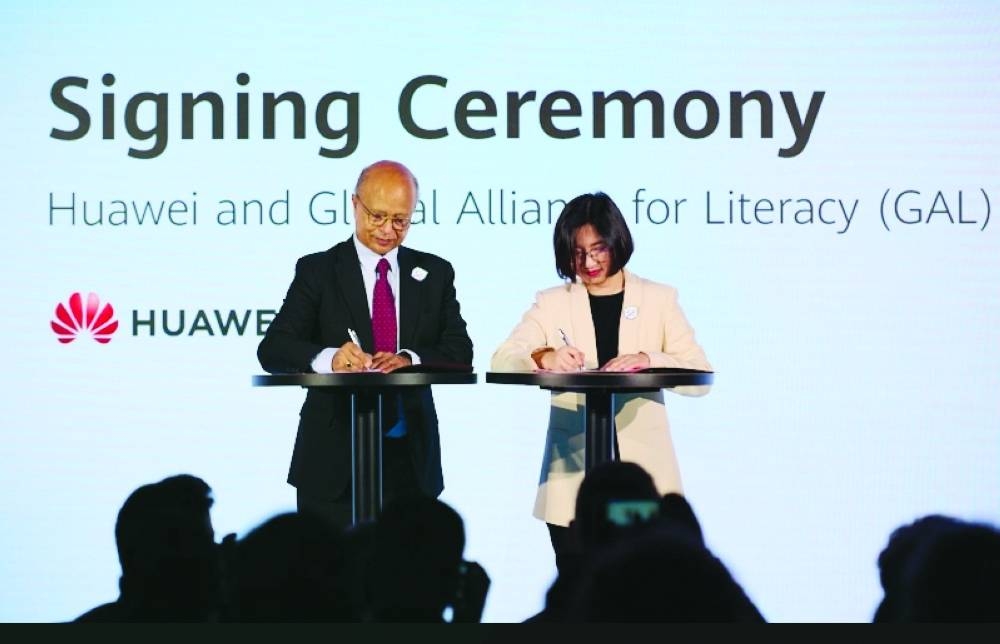Huawei announced it has joined the Unesco Global Alliance for Literacy (GAL) as part of the company’s lead-up to the Mobile World Congress 2023.
The announcement was made at a Digital Talent Summit co-hosted by Huawei and the Institute for Lifelong Learning (UIL), which serves as the Secretariat of the GAL.
At the summit, Huawei and the UIL agreed to jointly promote the use of technology to raise literacy.
The two parties also signed a co-operation agreement under which Huawei will fund an expansion of the UIL’s current initiatives to enhance educators’ use of technology in developing countries. Currently, the UIL initiative operates in Bangladesh, Cote d’Ivoire, Egypt, Nigeria and Pakistan.
Huawei is the first private company to become an associate member of the GAL and the company is excited its own goals align with the GAL’s vision of eradicating digital illiteracy in young people, a press statement noted.
UIL director David Atchoarena explained at the event, “Our rapidly changing world calls for concerted efforts and strong partnerships to achieve quality education and lifelong learning for all.
“Huawei’s expertise in the area of innovation in learning will be a great asset to the Global Alliance for Literacy. Collaborative projects such as ours will ensure that no one is left behind on this journey.”
Huawei’s vice-president of corporate communications, Vicky Zhang, said: “Getting the right education is often the key to success in life. As a major player in the technology sector, Huawei feels it has a responsibility to provide technology skills in all parts of the world, trying our best to include as many people as possible.”
“We are proud to join forces with Unesco to better deliver on this responsibility,” Zhang added.
Huawei believes digital talent is a key driver in achieving digital transformation, solid economic growth, and better quality of life, the statement points out. Since 2008, Huawei has offered a wide and expanding range of talent programmes. Under its Seeds for the Future umbrella, Huawei provides tens of thousands of people every year with scholarships and digital training courses targeting all age groups. The company also organises and sponsors tech competitions where students can expand their knowledge, win prizes and make new friends.
Husain Basem Hasan, student at Bahrain Polytechnic, represented talents from the Middle East at the Digital Talent Summit. As a winner of the latest Huawei Middle East ICT Competition from Bahrain, Hasan expressed his gratitude to Huawei for granting him the opportunity to be part of this unique experience.
Dr Piti Srisangnam, executive director of Asean Foundation, applauded Huawei’s contribution to the local talent community. “The Asean Seeds for the Future programme that we launched in 2022 together with Huawei has already become a resourceful platform for hundreds of local students in 10 Asean countries to gain ICT knowledge and have cultural exchanges,” he said.
John Omo, secretary-general of African Telecommunication Union (ATU), also emphasised the necessity of bridging the local talent to the international community. He said, “It is critical that youth in Africa have access to global opportunities and can be a part of global conversations.”
Jorge Ramirez Marin, president of the Commission of Science and Technology of Mexico Senate, also called for a global synergy. "Digital education should be a factor that brings us closer to equity, instead of aggravating inequality," he said.
The summit concluded with a panel session on imagining the future of education.
The panel discussion was shared by George Gilder, renowned economist and co-founder of the Discovery Institute, Dr Ricardo Gil-da-Costa, CEO and co-founder of Neuroverse, and two Huawei Seeds for the Future alumni.
So far, Huawei’s Seeds for the Future programme has helped nurture more than 2.2mn digital talents in over 150 countries. The company’s ICT Academy can train about 200,000 students each year.

Vicky Zhang and David Atchoarena signing the agreement.
